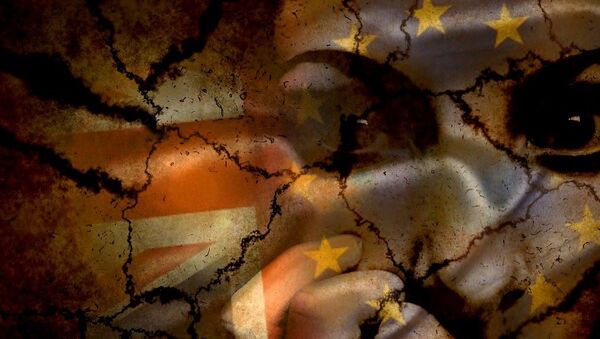At a June 2 event, several experts gathered at University College London to discuss the approaching UK referendum and the impact of the vote on the 27 other EU member-states.
Several EU states were present at the debate, including Poland, represented by Agatha Gostynska-Jakubowska, a research fellow from the Centre for European Reform. Joining her from Denmark was Dr. Sara Hagermann, an assistant professor at the LSE European Institute. Germany was represented by Die Welt correspondent Alan Posener, and Ireland sent Brian O'Connell, UK consultant director of the British Irish Chamber of Commerce and former editor of RTE news.
Speaking for the 27 other EU member states outside of the UK, all four participants were in agreement that the Brexit was the hot topic in their countries, also agreeing that a UK departure from the EU would have extremely negative effects on the alliance. Participants discussed trade and issues of xenophobia, but a key concern for one country is the potential loss of a very close ally.
EU, UK & Europe threatened by Brexit: If Brexit, Germany and France need to stop the EU from — IBT, UK Edition https://t.co/RSDbQyEvYq
— Positives4EU (@positives4eu) 2 июня 2016 г.
Poland led the opinion discussions, observing reactions from Polish citizens and government officials, over a potential Brexit vote by the UK.
Acknowledging the attention the referendum is getting in Poland, Gostynska-Jakubowska focused on the differences between government and experts opinions, suggesting that each group is responding to different agendas.
"If Britain was to leave the EU what will happen to all the Polish people currently living in the UK? Will they have to leave the UK or can they stay? Neither the UK or Poland are able to answer this crucial question," Gostynska-Jakubowska said.
For Ireland the significant issue is the loss of a close ally. The UK plays a crucial role in the Good Friday Agreement, and, in the event of a Brexit, this would not only impact the relationship between UK and Irish citizens and organizations, but it could also have an effect on the agreement, which is currently held in place by the EU. The fragile agreement remains in place only if the UK remains a member of the EU. O'Connell highlighted that over 7 million Irish citizens will be able to vote in the upcoming referendum, and that the Irish government is very concerned about the possibility of the UK leaving the EU. Over 400,000 jobs in Ireland depend on the alliance, and, when joined with the already fragile Good Friday Agreement and the state of the economy in Northern Ireland, it would not make for a happy ending if the UK decides to leave.
"If Britain were to leave, the key area of immigration is raised and this in turn will bring about the question around travel. If Britain tightens border controls from EU countries, what will they do concerning the free travel area? That free travel area helps with trade," O'Connell said.
The Irish consultant did offer a hopeful point, saying that if Britain were to leave, his country would maintain the excellent bilateral relationships they have with the UK.
Sinn Fein MEP makes the very valid — and worrying — point that Brexit could have devastating consequences for Good Friday Agreement. #euref
— Adam Terry (@adamrossterry) 3 февраля 2016 г.
For Denmark the story is no better, as Dr. Hagermann pointed out that the key concern for Copenhagen in a Brexit would be the lack of involvement that the UK would have in crucial debates concerning the ongoing European refugee crisis. If the UK were to be removed from these discussions, especially as they currently play a central role in the talks, this would be detrimental, according to Dr Hagermann. However, if the UK remain in the EU, Denmark would also seek special concessions from the bloc, similar to those recently acquired by UK Prime Minister David Cameron.
"Denmark will want to increase their concessions within Brussels, we would want the same as the UK, plus more. So, for example, stopping migrants from getting benefits until they have been in the country for 5 years," Dr Hagermann said.
Article: Stay or go, Brexit vote bound to unravel EU https://t.co/cvqPFHNuxn https://t.co/jYjKG7VQqm
— Alan Day — UKIP PPC (@CoaghUKIP) 30 мая 2016 г.
The most dour picture was painted by the German representative, including concerns around rising xenophobia, populism, racism and nationalism in his country.
Posener highlighted recent comments made by the right-wing Alternative for Germany (AfD) party, in relation to the country's best soccer defender, Jerome Boateng. A senior leader of the AfD party suggested that his supporters would not like to have Boateng, whose father is Ghanaian, as a neighbor. For Posener, these comments highlight a growing racist trend in the EU. The German representative also drew reference to Russian President Vladimir Putin, who, in the former's opinion, has sought the demise of the EU for many years.
"I'm really worried about this, this that, in the UK, racists in Germany can question whether a black footballer should be your neighbour? Does the UK have a responsibility for the EU, yes it does. Will the trade barriers go up? We don't know," Posener told Sputnik.
Putin sees no unsolvable differences between Russia and EU — https://t.co/mzDzGj5hL2
— BNN-NEWS (@BNNNEWSCOM) 26 мая 2016 г.
Posener highlighted how crucial the EU is to German economic stability, but drew reference to the most important point, that the UK is a central ally to Germany.
"Britain has always been seen in Germany as the center, as the main ally in getting Europe to reform itself; for example Greece, making them become viable economies. If Britain leaves, who else is there?" Posener said.


